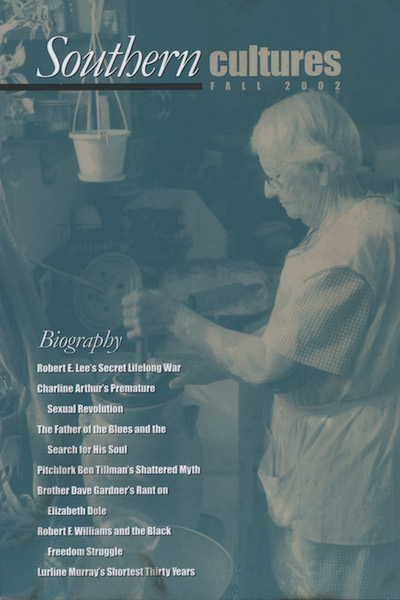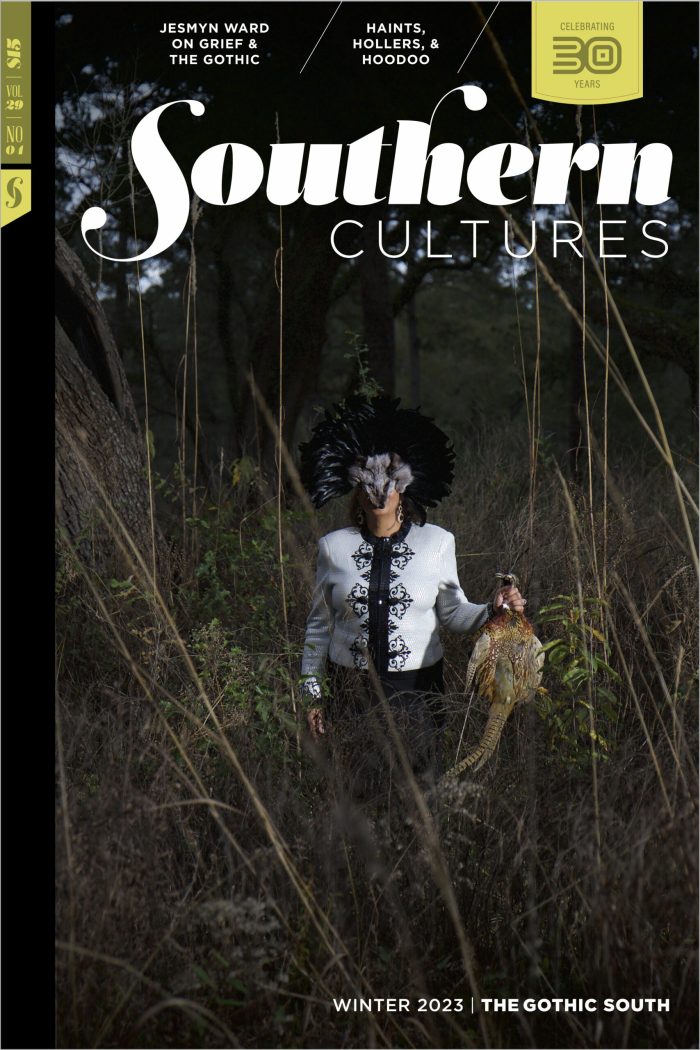by Harry L. Watson
“What fires burned beneath Lee’s famous calm?” My father’s family came from upper South Carolina, not far from Edgefield County, where the legendary demagogue Ben Tillman originated. After the end of Reconstruction, Tillman’s violent ranting on behalf of white supremacy and those he called “the farmers” brought down the more high-toned government of Wade Hampton, »
by Michael Fellman
“To be sure, Lee was an enormous flirt his entire life, and he may have acted on his erotic impulses outside the bonds of matrimony.” On a recent essay on Anton Chekhov published in The New Yorker, Janet Malcolm asserted that “the letters and journals we leave behind and the impressions we have made on »
by Stephen David Kantrowitz
It won’t shock readers of Southern Cultures to learn that when northerners begin to study the South, they bring along what we’ll just agree to call misconceptions. I know this firsthand because I remember a few choice and painful moments in my own early apprenticeship as a South-watcher. Born and raised in a suburb of »
by Timothy B. Tyson
“But nonetheless I have been lurking in the shadows, plotting and sulking like one of William Faulkner’s vindictive barn-burners.” I come from a family of preachers, teachers, and farmers, not academics, and most members of my extended clan don’t seem to have any clear sense of what a college professor actually does on, say, Tuesdays. »
W. C. Handy's Mississippi Problem
by Adam Gussow
“‘My idea of what constitutes music was changed by the sight of that silver money cascading around the splay feet of a Mississippi string band.'” Composer of the best-selling “Memphis Blues” and “St. Louis Blues,” author of an autobiography titled Father of the Blues (1941), W. C. Handy (1873-1958) has a curious place in the »
by Lea Barton
I was born in Yazoo City at the edge of the Mississippi Delta in 1956, the year Elvis Presley made his television appearance on the Ed Sullivan Show but was shown only from the waist up. My father was in the service, and I moved from city to city as a “Navy brat.” But no »
by Henry Taylor
“. . . if you wasn’t already prepared to stop, beloved, you shouldn’t have started.” 1.But you know, friends-blessed children of the all-encompassing spirituality-good advice is where you find it. Yes!
The Unmaking of a Honky-Tonk Star
by Emily Neely
“Charline’s use of sexual innuendo clearly confused the country music media.” Like most honky-tonk musicians, Charline Arthur came from modest origins. She was born Charline Highsmith in 1929, the daughter of a Pentecostal, relatively poor couple in Henrietta, Texas. Her parents were both amateur musicians, and from an early age music and performance were central »
The Experiences of Two Generations of Southern Black Men
by Angela Mandee Hornsby,
Molly Patrick Rozum
“This Black man called the Secretary of the Navy. And the Secretary of the Navy says to the judge: ‘Let him go.'” “They did not knuckle under to the institution of slavery or, following that, the institution of Jim Crow-ism,” reflected Edwin Caldwell Jr. on evaluating some two hundred years of his family’s history in »
Lurline Stokes Murray's Narrative of Farming and Faith
by Lu Ann Jones
“‘Honey, in our way of life, there ain’t no banker’s hours, and I don’t find in the Bible there’s no such thing as an eight-hour day.'” In 1986, as I began conducting oral histories with older southern farmers about changes in rural life, I asked an agricultural extension agent in Florence, South Carolina, to recommend »
by Stephen M. Ross
University Press of Mississippi, 2000 One of dozens of celebrations of Faulkner’s one-hundredth birthday all over the world, Faulkner at 100 has all the right stuff—smart people saying smart things about this great southern writer. Joseph Blotner, Faulkner’s first biographer and maybe the only person with credentials that permit him to wax sentimental, looks sentimentally »
by Frank W. Shelton
University Press of Mississippi, 2001 In the late 1970s, when I was first beginning to study seriously the work of Harry Crews, I asked C. Hugh Holman of the University of North Carolina’s English department to write a letter for me as part of a grant application to support my work. While he supported my »





